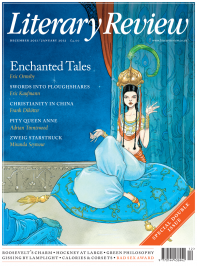Adam Sisman
A Historian’s Heart
The Wartime Journals
By Hugh Trevor-Roper (Edited by Richard Davenport-Hines)
I B Tauris 322pp £25
Does language matter? Hugh Trevor-Roper thought that it did. Nowadays it is fashionable to rate self-expression above precision. But Trevor-Roper believed that without clarity of language there can be no clarity of thought. Like Orwell (whom he admired), he knew that freedom is endangered when language becomes corrupt. These journals were written during the Second World War, when the defence of the English language against all forms of attack seemed especially important. They remained unseen until after his death in 2003, when they were discovered hidden in his house. Their publication now reveals a new side to the formidable historian. The notebook entries exhibit an intellectual in the process of formation: an isolated, reflective individual training his mind and refining his style.
Though only twenty-five when war broke out in 1939, Trevor-Roper had already finished his first book, a biography of Archbishop Laud. Influenced by his friend A J Ayer, he had formed the view that lucidity was the sole criterion of good writing. Trevor-Roper had swallowed Ayer’s prescriptions as a purgative

Sign Up to our newsletter
Receive free articles, highlights from the archive, news, details of prizes, and much more.@Lit_Review
Follow Literary Review on Twitter
Twitter Feed
Under its longest-serving editor, Graydon Carter, Vanity Fair was that rare thing – a New York society magazine that published serious journalism.
@PeterPeteryork looks at what Carter got right.
Peter York - Deluxe Editions
Peter York: Deluxe Editions - When the Going Was Good: An Editor’s Adventures During the Last Golden Age of Magazines by Graydon Carter
literaryreview.co.uk
Henry James returned to America in 1904 with three objectives: to see his brother William, to deliver a series of lectures on Balzac, and to gather material for a pair of books about modern America.
Peter Rose follows James out west.
Peter Rose - The Restless Analyst
Peter Rose: The Restless Analyst - Henry James Comes Home: Rediscovering America in the Gilded Age by Peter Brooks...
literaryreview.co.uk
Vladimir Putin served his apprenticeship in the KGB toward the end of the Cold War, a period during which Western societies were infiltrated by so-called 'illegals'.
Piers Brendon examines how the culture of Soviet spycraft shaped his thinking.
Piers Brendon - Tinker, Tailor, Sleeper, Troll
Piers Brendon: Tinker, Tailor, Sleeper, Troll - The Illegals: Russia’s Most Audacious Spies and the Plot to Infiltrate the West by Shaun Walker
literaryreview.co.uk